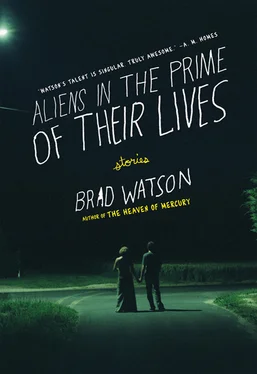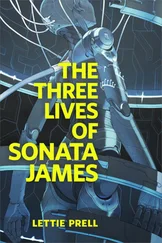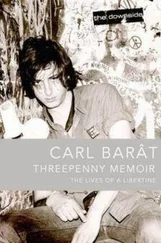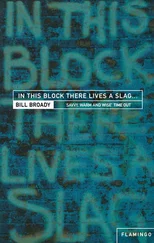Olivia scrambled for her panties and bra. I groped for my own underwear and pants, pulled them on, opened the side door of the bus, and stepped barefoot onto the cool ground. I closed the door behind me, for Olivia’s sake.
The two cops shone their flashlights on me, keeping their distance.
“What are you doing here?” one said.
“Well,” I said, gestured, shrugged. I hiccuped out a nervous laugh.
“He thinks it’s funny,” the one cop said.
“I do, too,” the other cop said. He was older than the first cop, and a little shorter and stouter. That’s about all I could tell, in the dark with only their flashlights in our faces for light.
“The people who live in those houses right over there don’t think it’s funny,” the younger cop said. “They thought maybe you were parking here to case their houses.”
“Rob them,” the older cop said. “Break in, steal things, or worse.”
“Much worse.”
“I didn’t know they could see us,” I said.
They said nothing. The first cop leaned his head toward the bus window to look in at Olivia, trying to cover herself, cowering on the floor in there.
“All right, miss, get out and get your clothes on.”
They stepped back to let her out and kept their flashlights on her as she got dressed. They were quiet, as if they were studying her. This made me angry and I almost said something. She was crying. I moved closer and stood beside her. Something about looking at her in the small harsh glare of the cops’ flashlights made her seem all the more vulnerably beautiful to me. When she was dressed the cops switched off their flashlights. Every now and then they’d switch them back on and shine them into our eyes as we spoke. They asked us who our parents were. Where we lived. How old we were. But they didn’t really seem to care about any of that, hardly waiting for our answers, seeming bored. In the end they let us go with a warning not to park there again and a few halfhearted words about hauling us in if they ever caught us doing this again, and told us to go home.
“You know what’s going to happen, you keep doing this,” the younger cop said. “You know how it is that people make babies? With the old in and out?”
“ A-makin’ whoopee ,” the older cop said, and laughed.
“Seriously,” the younger cop said. “We’re gonna keep an eye on you.”
“’Bye, now,” said the older cop, giving us an odd little wave. Then they got into their squad car, backed out onto the road, and drove away. Strange cops.
WHEN WE GOT BACK to town after eloping, the apartment all ready for us to live there officially, we went to tell our parents what we’d done.
We went to Olivia’s house first.
“Oh,” her mother said, deflating into the sofa cushions, a hand over her mouth. “Oh, oh, oh.”
“WHAT?” her father said. He was a tall, good-natured man with a heart condition, who spoke very loudly and was a little bit deaf. He’d been an artilleryman, when he was young, in the war.
“THEY’RE MARRIED, IKE,” Olivia’s mother said loudly back to him.
It took a moment to register. He stood there vacantly, looking at her, then cast an embarrassed glance at us before jamming his hands into his trouser pockets.
“Well,” he said softly, “no use crying over spilt milk.”
THEN WE WENT TO my parents’ house. My mother was at the kitchen table, in a very good mood, nibbling peanut brittle. My father was in the back bedroom, reading a magazine. The kitchen opened up to the den, and Olivia sat in there on the couch, her knees pressed together in terror.
I sat down opposite my mother at the table, under the bright bulb of the hanging lamp. I didn’t want to go through with it. But it was too late for that.
“I have to tell you something,” I said.
Her nibbling slowed. She could tell something was wrong.
“Olivia and I got married,” I said. I said it quietly. So quietly that Olivia and my younger brother, Mike, sitting on the sofa on the other side of the den, couldn’t hear it. Of course, Olivia knew what I was saying. She sat there and stared into something only she could see. I said to my mother, “We went over to Livingston and did it this afternoon.”
She said nothing for a moment, unable to swallow the brittle in her mouth. When she finally could, she whispered, “Is she pregnant?”
It was awful to look at her eyes just then. A sudden grief had filled them, laced with a terrible dread, a horror, really, as if I’d just told her that one of us, one of her children, had died.
I nodded.
She got up from the table and walked to the back of the house. I looked over at Olivia. She had closed her eyes and grabbed on to my little brother’s hand. He looked confused but not displeased to have Olivia holding his hand.
In a minute, as I was pacing in the living room, my father came in and asked me if what my mother had just told him was true. I nodded.
He didn’t say anything, looking as if he couldn’t comprehend it.
“What are you going to do?” he said.
“We have a place, an apartment over by East Mississippi,” I said. It’s what everyone called the asylum. “We’re going on over there, I guess.”
“How far along is she?”
“About five months, we think.”
“Damn,” he said. He shook his head, jingled the coins in his pocket. “Well, go on over there, then,” he said. “We’ll talk about it tomorrow. I have to go see about your mother. I think this is about to kill her.”
Olivia and I drove to our little apartment, mounted the rickety steps to the deck, and went inside. I turned on the big, chuffing fan, to pull out the stifling air. We sat down on the sofa, nothing but the engulfing huff of the fan for sound, the hot breeze searing our skin, beneath the bare bulb of the overhead light.
THE BARE BULB LIGHT was so harsh, I lit candles instead and set them on the coffee table. Olivia had brought over her old cat, Max, and he rubbed against my leg, hungry. I fed him, and checked the seedcake in the cage of her parakeet, Donald, who whistled and made as if to bite my finger. She’d left her pet rabbit, an old Easter gift, with her parents, because she’d never liked it, with its weird red eyes and bland personality. I think she felt guilty about it, though. I’d told her to leave them all, afraid the heat in the place would kill them during the day, but she couldn’t.
She’d been sitting on the sofa, that slightly stunned and day-dreamy look on her face I loved so much, and I’d taken heart. But then she seemed to come to, got up from the sofa, and began pacing up and down the little hallway from the living room to the bedroom and back. She took off her Keds and walked barefoot on her longish narrow feet, with the pretty toes I liked to roll between my fingers and call them her peanuts. She was crying quietly. At first I couldn’t tell. The place was so hot, before the fan had a chance to help out a bit, that we’d started sweating the moment we walked in, my T-shirt and Olivia’s peasant smock blotched with dampness, and our faces shone with perspiration. When I saw she was crying, I held her for a minute, but it was still too hot for that. I got her to sit at the kitchen table in front of the dormer window there for the breeze. I brought one of the candles in from the living room and set it beside the fridge, on the counter away from the window so it wouldn’t blow out.
There wasn’t much to eat, but there was a fat ripe tomato on the counter, and a new unopened jar of mayonnaise, and a loaf of white bread. I tore off a square of paper towel for a plate and made each of us a tomato sandwich, and got two beers from the fridge, all the while keeping an eye on Olivia to see if she was cheering up at all. We ate the sandwiches and sipped the beers, not talking. Olivia was still sniffling a little bit but she was coming around. When we’d eaten, I took her by the hand and led her to the living room, and put a record on our little record player, some easy stuff. Maybe it wasn’t the best choice. It was by that singer, Melanie, and when she sang “Look What They’ve Done to My Song, Ma,” Olivia started sniffling again. I was holding on to her and shuffling us around in the old Teen Center slow dance, and she dug her chin into my collarbone and started to bawl.
Читать дальше












